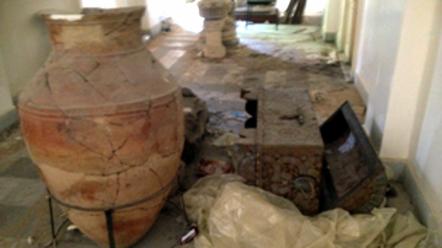It has been documented that ISIS [Daesh], and Jabhat a-Nusra [al-Nusra Front] use WhatsApp and Skype (Parkinson, Albayrak, & Mavin, 2015), and some terrorists are using smartphones (Sogue, 2014) as well as employing social-media savvy experts around the world, often teenagers, to design and execute looted antiquities marketing programs.
The financial incentives to looting are very powerful such that to date the international community’s existing methods of prevention are largely ineffective, the US Professor Frankiln Lamb said in a report- obtained by the Syriatimes e-newspaper- on confronting ‘looting to Order’ and ‘cultural racketeering’ in Syria.
He quoted the Antiquities Coalition as saying: ” raising just $1 million from illicit trafficking of historic artifact in Syria supplies the terrorist group with more than 11,000 AK-47 machine guns or 1,250 rocket launchers. This is one of the reasons why Satellite images are revealing that archaeological sites in Syria are increasingly dotted by thousands of illegal excavations.
” Several encouraging and admirable public and private initiatives are employing creative ways to protect Syria’s millennia-long cultural heritage are currently underway as experts and locals scramble to save what they can. Others are about to be launched,” the professor asserted.
“Shared heritage”
The Syrian government currently has 2,500 people working to save Syria’s past, while 14 DGAM employees have been killed so far, according to the Director-General of the Antiques and Museums Maamoun Abdulkarim , who added that ‘ “We saved 99 per cent of the collection in our museums. It’s good. It’s not just for the good of the government. It’s for the opposition, for humanity, for all Syria. It is our common identity, our common heritage.”
He called on the international community to take action to protect our ‘shared heritage’ in the Middle East, before it is too late.
Speaking in the first of a series of heritage talks organized by the World Monuments Fund, Abdulkarim highlighted the DGAM ongoing and impressive efforts to safeguard Syria’s remaining treasures.
There are 10.000 archeological sites in Syria, 300 of them have been damaged since the beginning of the terrorist war on Syria, the DGAM Director-General told the French Le Figaro newspaper.
Basma Qaddour

